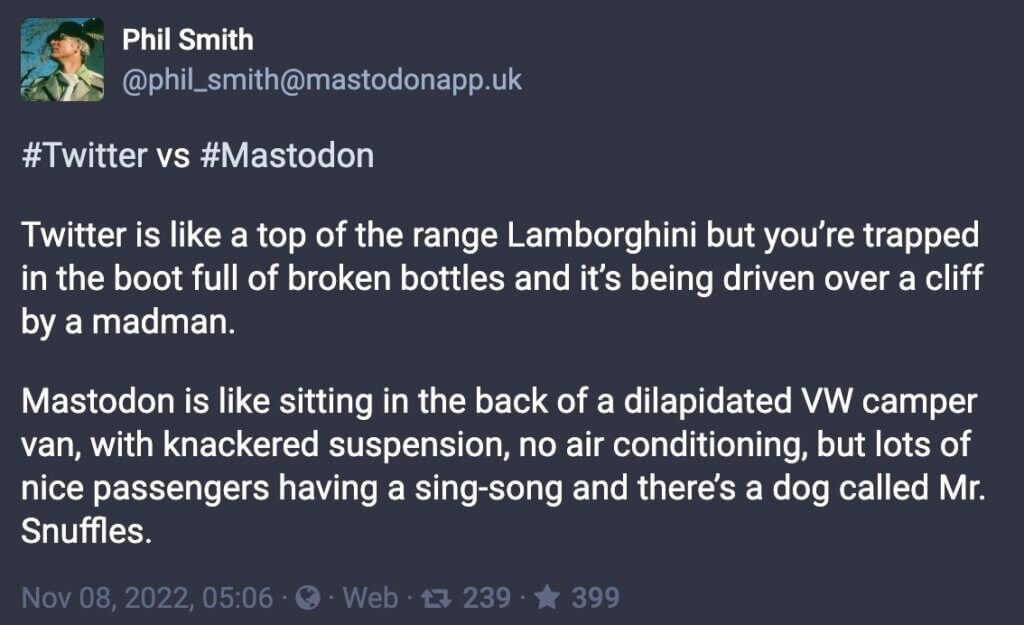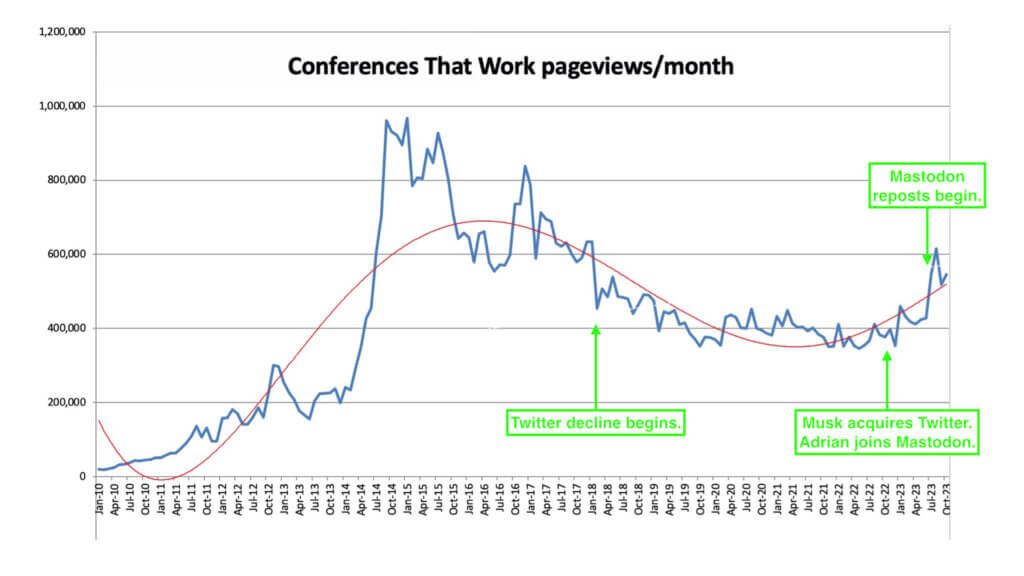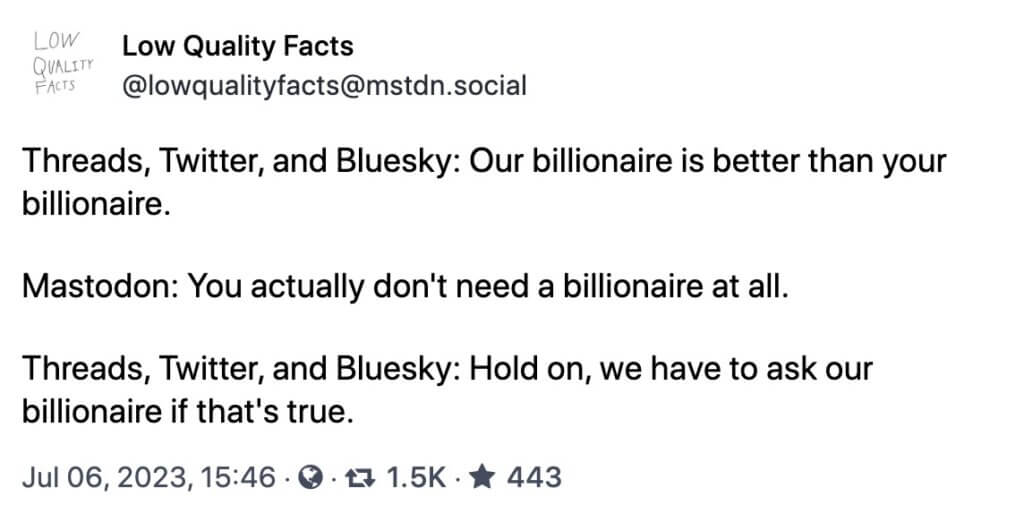I joined the social media platform Mastodon a year ago. Given recent turbulent social media trends, I’m glad I took the plunge. Having been on Twitter (yes, I know it’s been renamed “X”, sue me) since 2009, I’d describe Mastodon as the old Twitter.
What do I mean by that?
What Twitter is now
Ever since Twitter’s creation in 2006, people have used it in different ways. Many have striven for massive follower counts and social media “influence”. Others, like myself, have enjoyed the platform’s often-strained ability to discover and sustain communities of interest on a myriad of topics. From my viewpoint, the platform’s popularity and usefulness reached a peak between 2014 – 2017. Since then, Twitter began a slow decline. (See the graph of my monthly website pageviews below.) That is, until Elon Musk took over Twitter in October 2022, and its status as a stable social media platform rapidly imploded, leading to the following colorful comparison by Phil Smith of Twitter versus Mastodon in November 2022…
“#Twitter vs #Mastodon
Twitter is like a top-of-the-range Lamborghini but you’re trapped in the boot full of broken bottles and it’s being driven over a cliff by a madman.
Mastodon is like sitting in the back of a dilapidated VW camper van, with knackered suspension, no air conditioning, but lots of nice passengers having a sing-song and there’s a dog called Mr. Snuffles.”
Now I don’t agree that Mastodon is the kind of hippy-dippy place that Phil Smith characterizes, though it includes some of that vibe. Counter Social is a much better fit, as described in my post Alternatives to Twitter.
Enshittification
I think most people agree that Twitter has gone through more upheavals in the last year than in the five previous years combined. Twitter under Musk is an example of rapid enshittification, a term coined by Cory Doctorow describing what happens “where a platform sits between buyers and sellers, hold each hostage to the other, raking off an ever-larger share of the value that passes between them.”
I, and many others, have written about the increase in toxicity on Twitter since Musk took over. I won’t say more here.
With ~8,400 followers on Twitter, I have seen engagement with my posts plunge 50% over the last year. Part of this is due to some of my most active followers leaving Twitter. But I think that Musk’s decision to prioritize tweets without links is another factor. Recently I’ve noticed that my retweets of and comments on posts receive 50 times more engagement than my regular tweets-with-links. This didn’t used to be the case.
I’ve used Twitter for 15 years to create, discover, and support many communities of practice. Until recently, it was still possible to hold conversations there. But today, Twitter is a morass of people shouting at each other. Very little listening is going on. Without a framework and support for conversation, I don’t know how much longer I’ll stay active on Twitter.
What Twitter was back then
When I joined Twitter in June 2009, the platform was just about to take off. By the end of the year, “Twitter” was declared the top word of 2009.
Twitter felt like a magical place at the time. It was the first major social media platform where the majority of posts were public and searchable. (In 2019, only ~13% of Twitter accounts were private.) Whatever you were interested in talking about, Twitter made it easy to discover kindred souls. The invention of the #hashtag in 2007 made it easy for users to find specific relevant content and communities.
The old Twitter was an essential place for me to discover, join, and cocreate the #eventprofs and #assnchat communities. For that, I’ll always be grateful.
In those days, running Twitter chats was viable and fun! Communities sprang up around shared interests and events. Twitter chats remained useful tools for a community for several years until the rise in hashtag spam reduced their popularity. Although a few Twitter chats still occur today, their glory days are over.
Mastodon is the old Twitter
Currently, Mastodon reminds me of the old Twitter. While engagement on Twitter is a shadow of its former self, I am seeing a significant rise in visits to my website — around 20% — since I started also posting on Mastodon. This is despite my having just a few hundred Mastodon followers. The graph below shows page views per month on www.conferencesthatwork.com for the fourteen years between 2009 and 2023. You can see the impact of the start of social media posting to Twitter in 2010, the four glory years of Twitter that started in 2014, the gradual decline and flattening that began around 2018, and the significant rise in July 2023 when I began reposting to Mastodon.
My posts on Mastodon are frequently liked and boosted; most of them far more frequently than the same posts are liked or retweeted on Twitter.
While my followers on Twitter have been stagnant since 2014, new people continue to find my content on Mastodon and follow me. Conversations on Twitter are now almost nonexistent, while on Mastodon I engage with other people every day.
Mastodon is a much better fit for me than today’s Twitter. It feels like the old Twitter. And with Mastodon’s no billionaire owner and no ads design, I’m optimistic that it may stay that way.
The old Twitter is gone. Long live Mastodon, the old Twitter!



